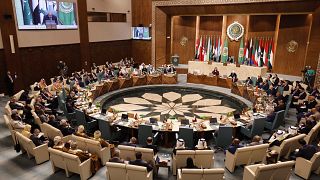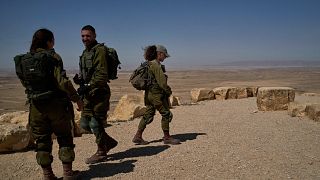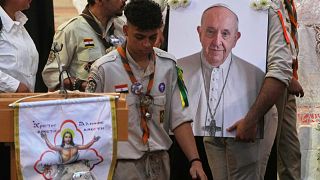Egypt
An aid convoy with supplies for Gaza waits on the outskirts of the Egyptian city of Ismailia, on Monday (Oct. 16).
Media reports had said Israel, Egypt and the United States of America had agreed the Rafah crossing between Gaza and Egypt would be opened for several hours Monday in a one-off move to allow foreign nationals to flee and aid goods to enter.
By Monday afternoon, the crossing remained closed, locking convoys of aid on one side of the border, and fleeing Palestinians and foreigners on the other, according to AFP correspondents and witnesses.
The Rafah border crossing, the only passage in and out of Gaza not controlled by Israel, is controlled by Egypt.
Hundreds of foreign nationals wait at the gate of the Rafah border crossing with to flee.
Since October 7, some 2,750 people in Gaza have been killed by Israeli air strikes, launched in retaliation for a Hamas militant attack that killed 1,400 in Israel.
Israel has cut off the flow of food, medicine, water and electricity to Gaza, pounded neighborhoods with airstrikes and initially ordered the estimated 1 million residents of the north to flee south within 24 hours ahead of an expected ground offensive.
NGO Doctors without borders among others have since called for "safe zones to remain in the north and for regular ceasefires." Groups have also criticized the move arguing the sick, wounded and hospitalized couldn't flee at such a short notice.
Moreover, many Palestinians fear a repeat of the most traumatic event in their tortured history, their mass exodus from what is now Israel during the 1948 war surrounding its creation.
Palestinians refer to it as the Nakba, or “catastrophe." An estimated 700,000 Palestinians, a majority of the prewar population, fled or were expelled from what became the state of Israel in the months before and during the war, in which fighters of the future State of Israel fended off an attack by several Arab states.
The Palestinians packed their belongings, piling into cars, trucks and donkey carts. Many locked their doors and took their keys with them, expecting to return when the war ended.
Cairo has so far rejected calls to accept refugees from the Gaza strip warning of a fresh forced displacement of Palestinians and instead urging restraint and diplomatic efforts for deescalation.











Go to video
Italy’s FM supports Arab plan for Gaza reconstruction without displacing Palestinians
01:42
Cairo service honours Pope Francis' legacy
Go to video
Heavy equipment needed to clear rubble destroyed in Israeli strike on Jabaliya
Go to video
Palestinian health official condemns Israeli strike on hospital in Gaza City
Go to video
Letsile Tebogo shines at FNB Golden Prix ahead of 2025 World Championships
Go to video
Palestinians face displacement and uncertainty after new Israeli orders